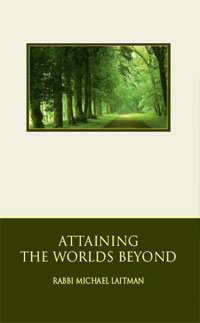Overcoming Distractions Along the Spiritual Path
When we are distracted by outside thoughts, we feel that thoughts obstruct us from ascertaining the spiritual, because our strength and minds are wasted on extraneous concerns, while our hearts become filled with petty desires. At times like this, we lose faith in the fact that only Kabbalah contains the true life.
Once we overcome this condition, we come out of our state and move into the Light, receiving a higher Light that helps us ascend further. In this manner, our extraneous thoughts work to help us in our spiritual advancement.
Towards the Source of Spiritual Strength
We can overcome obstacles only with the help of the Creator. We can only work on something if we perceive some personal benefit in the task. However, our bodies, hearts and intellects do not understand what benefits can result from altruism.
Therefore, as soon as we try to make even the slightest altruistic move, we lose all strength of the mind, heart and body. We are left with nothing else but to turn to the Creator and ask Him for help. In this way, unwillingly and without any free choice, we advance toward the Creator until we merge with Him completely.
If we do not advance on the right path, what difference does it make if we are endowed with the best abilities and potential?
It may be that a talented person can become a great scientist, but without a connection with the Creator, this person’s purpose will not be achieved, and will fail just as the majority of people do.
It is crucial to attain the level of a righteous person; only then can we use all of our potential for the right tasks, rather than squander our strength in vain. Even the weakest and most trivial abilities given to us by the Creator should be used for the sake of the loftiest goals.
Desires For and Against Spiritual Advancement
The task of one who has reached a certain spiritual level is to make a selection from the myriad of pleasures that arise, immediately discarding all those pleasures that cannot be balanced by faith, since they are not fit for use. In Kabbalah, that part of pleasure that a person receives for the sake of the Creator, for the sole purpose of strengthening one’s faith, is considered “food.”
On the other hand, the other part that one is unable to receive is considered “refuse.” If a person is incapable of distinguishing between the two and wants to devour the entire portion (in Kabbalistic terms, “to become drunk from the excess of pleasure”), then that person loses everything and is left with nothing. In Kabbalah, such a person is known as a “pauper.”
Calculating Reward Vs Punishment in Spirituality
If we are unaware of the pain and suffering that may result from breaking the law, then we are bound to break the law, since as a result we will receive pleasure. Consequently, we will receive the punishment as well, in order that we realize that in the future we should not act in this particular manner.
For example, there exists a law that one is not permitted to steal money. But if a person possesses a strong pull toward money and knows where the money can be stolen, the crime will be committed. This is so even if there is no doubt that a theft will be followed by a punishment; the potential thief will still be incapable of realizing the full extent of the suffering that will follow the transgression.
Therefore, the person will decide that the pleasure from acquiring the money will exceed the suffering from the punishment that will follow. But when the suffering actually arrives, the thief then realizes that the suffering far exceeds expectations, and is certainly greater than the pleasure procured by the theft. At that point, the thief becomes ready to follow the law.
Once a person becomes free, a warning is given that the punishment for the next transgression will be much greater. This is done so that one does not forget the suffering that was experienced.
Thus, when the desire to steal arises again, one is reminded of both past suffering and the warning that the next punishment will be much more severe than the previous. This provides some incentive to hold oneself back from engaging in theft.
Imitating Altruism to Gain Spiritual Advancement
A person who decides to learn Kabbalah should know that it is for one’s own good. In other words, a person should realize that the ego will benefit from such actions. None of us can take upon ourselves the burden of work that is completely selfless, that does not yield money, honor, pleasures, or hope for a better future.
Moreover, we are incapable of engaging in work that does not yield any results or any fruits; that does not bestow anything upon another; that does not result in any benefit being conferred upon another, or that appears to produce only senseless efforts in empty space.
It is natural that our egoistic reason and bodies are not prepared for such a task, because they have been designed by the Creator to receive pleasure.
Thus, we try altruism in the hopes that we will find redemption on this new path. Although this new approach to life cannot be considered to be ultimate altruism, since the goal of our actions is personal well being and salvation, this approach nevertheless approximates altruism.
It allows us to proceed gradually to the desired state, under the influence of the Light that is concealed in our actions. By behaving altruistically, but still benefiting because we are giving in order to receive, we begin to perceive the Light (pleasure) that is concealed in our actions. The nature of this Light is such that it corrects us.
 “How Selfish Giving Produces Spiritual Advancement” is based on the book, Attaining the Worlds Beyond by Dr. Michael Laitman.
“How Selfish Giving Produces Spiritual Advancement” is based on the book, Attaining the Worlds Beyond by Dr. Michael Laitman.

